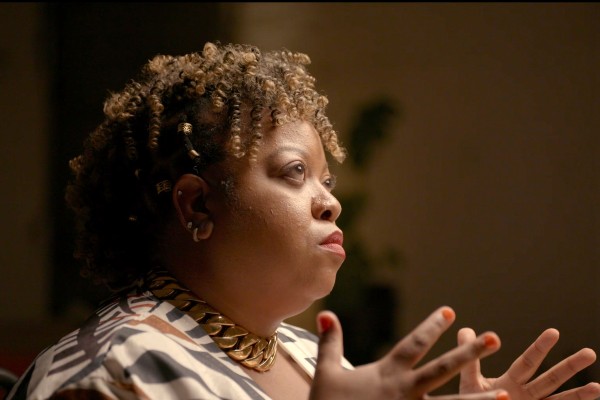
This image released by A24 shows Nikenya Hall in a scene from the documentary “Look Into My Eyes.” (A24 via AP)
Filmmaker Lana Wilson had never thought much about psychics. But the morning after Election Day in 2016, in Atlantic City, New Jersey, she found herself drawn towards a sign that promised “$5 psychic readings” and wandered in.
Much to her surprise, she found it to be a rather profound experience. She can barely even remember what was said, but it was emotional and comforting. And it would set her on a seven-year journey to make a documentary about this strange and misunderstood tradition, “Look Into My Eyes,” which expands in theaters this week.
“I think I had totally misjudged the whole psychic tradition,” Wilson said. “I had trivialized it and seen it as this silly thing, despite the fact that millions of people around the world engage in it… I’d had this personal experience where I, as a lifelong skeptic, found comfort in a psychic one day. So part of my initial perspective was what if it doesn’t matter if it’s real or not?
In the years since that fateful encounter, Wilson’s own profile has raised significantly for her documentaries about Taylor Swift, ” Miss Americana,” and Brooke Shields, ” Pretty Baby.” But the idea of the psychics lingered. The film, unjudgmental, funny and poignant, takes viewers inside the homes, and sessions, of several New York City psychics
Wilson spoke about her process, her revelations and why she decided to not take Shields up on her offer to be one of the subjects in this one. Remarks have been edited for clarity and brevity.
Q: Did you find many of your friends shared your own assumptions about psychics?
WILSON: One of my closest friends is a therapist and she immediately got it. She was like, “This is totally different than therapy. But, also, that’s what’s interesting about it.” You can believe or not believe the supernatural part of this, but there’s this human connection that is undeniably going on. And that’s what’s so fascinating and complex and rich and can bring up ethical questions for sure. The other thing is that my therapist friend said to me once is that an emotional experience is real for the person who’s going through it. There’s so much wondering what’s real and what’s not real. But the emotional experience is real or at least meaningful no matter what. Thinking about that allowed me to think about my own relationship with seeing movies and art. For example, I go to a movie theater craving connection and insight and some kind of emotional catharsis, and what I’m seeing on screen is fake. It’s constructed, but it also feels very real and sometimes actually feels more real than our real lives. And so that became this activating question for me as I made the film. Can something be both artificial and real at the same time?
Q: How did you select your characters?
WILSON: I and three other people working with me saw over 100 psychics in all five boroughs of New York. Then we would meet up and compare notes and discuss. I ended up very quickly moving away from storefront psychics and gravitating towards a very different type of practitioner who operates a little more at the intersection with therapy. They turned out to have a surprising amount in common. Many of them were former actors and creative people and writers. Several of them were diehard cinephiles. Then I learned over the course of filming that many of the psychics shared a profound experience with personal loss or some kind of trauma that had affected them their whole life.
Q: Were you at all tempted to add a celebrity element to this, after your films about Taylor Swift and Brooke Shields?
WILSON: Brooke, who is just the most incredible person, she offered at one point. She was like, “Do you want me to do a reading in the film?” I actually think that would be so amazing that it deserves its own film, because imagine, Brooke seeing a psychic and then channeling her dead mother?
I had the idea for this film before even starting “Miss Americana.” I’m really glad that I made those two films and then came back to this because I learned so much about filmmaking from those two experiences. I think the biggest thing was that we all, whether we’re famous or not, we all crave witnesses to better see ourselves. I realized that I had a lot in common with the psychics: These people are sitting in front of us and all of their fragility and vulnerability and humanity, and they’re taking a leap of faith in a way that we won’t hurt them with what we say and see and share. That parallel became a huge part of this film for me as well.
Click HERE to read the original article.